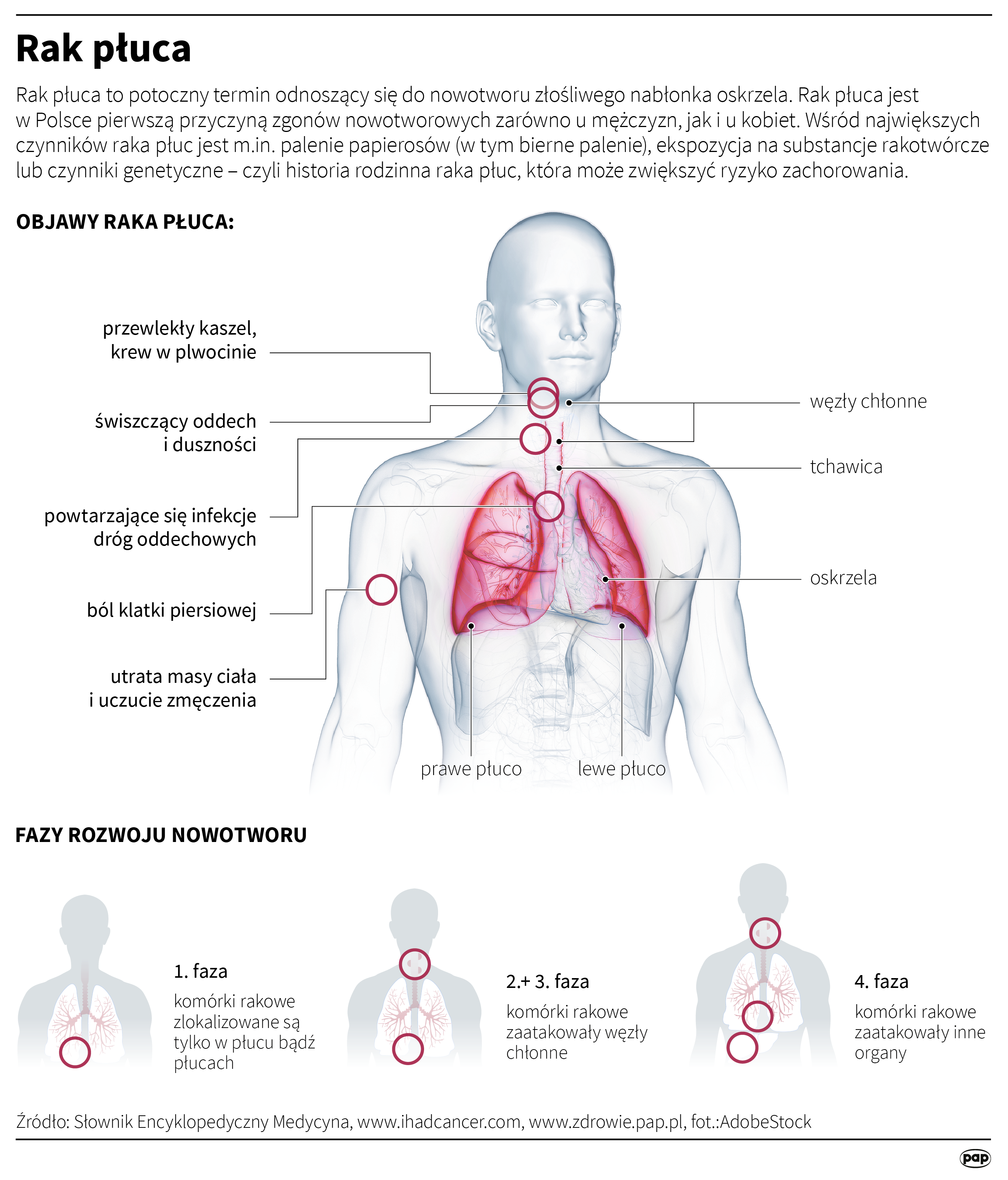Experts: Targeted treatment for lung cancer is becoming even more precise

Thanks to bispecific antibodies, the treatment of lung cancer in patients with specific mutations will become even more precise and effective, experts said at a press conference held on Friday in Warsaw.
As an example, they presented lung cancer patients with an activating mutation in the EGFR gene (the gene encoding the receptor for epidermal growth factor). These are mostly young, non-smokers and more often women.

As emphasized by Dr. hab. Magdalena Knetki-Wróblewska from the Clinic of Lung and Chest Cancer of the National Center of Oncology - National Research Institute in Warsaw, the challenge related to this type of lung cancer is that no one expects to be diagnosed with this cancer in non-smoking patients aged 40, 30 or even 20.
Experts present at the conference reminded that in Poland, approximately 22 thousand cases of lung cancer are diagnosed every year. "More than half of these patients are patients with a disseminated neoplastic process or with such an advanced disease that we cannot offer them radical treatment (carried out with the assumption of curing the patient - PAP)" - said Dr. Knetki-Wróblewska.
As many as 85% of all lung cancer cases are non-small cell lung cancer, of which 45% are adenocarcinomas. According to Prof. Paweł Krawczyk, head of the Immunology and Genetics Laboratory at the Medical University of Lublin, 10-14% of patients with this type of lung cancer have an activating mutation in the EGFR gene.
"Lung cancer patients with molecular disorders have a much higher risk of developing brain metastases, which are the metastases with the worst prognosis. That is why we need to have the most effective drugs for them," emphasized Dr. Knetki-Wróblewska.
She reminded that lung cancer patients with EGFR mutations are treated with targeted therapy in the form of EGFR tyrosine kinase inhibitors. "These drugs have proven to be more effective than chemotherapy previously used in all patients. They allow for longer survival without disease recurrence, extend overall survival and are better tolerated," the specialist listed.
She recalled that 15-20 years ago, most patients treated with chemotherapy died within a year of diagnosis. Thanks to targeted drugs, survival time has been extended to about 4 years.
Recently, it has turned out that the results of treatment of these patients can be further improved by adding chemotherapy to the targeted drug or - the latest achievement in medicine - bispecific antibodies, noted Dr. Knetki-Wróblewska. "This applies especially to patients with metastases to the brain, to the liver. These are patients who do not respond as well to monotherapy with a targeted drug as we would like," the specialist explained. She emphasized that the use of additional chemotherapy or bispecific antibodies extended the time to disease progression and overall survival, especially in patients with brain metastases.
In the opinion of Dr. Knetka-Wróblewska, in patients who are at higher risk of rapid disease relapse, treatment should be intensified early - by adding chemotherapy or a bispecific antibody.
“The combination of an oral tyrosine kinase inhibitor with the first bispecific anti-EGFR and anti-MET antibody resulted in a spectacular extension of progression-free and overall survival,” said Prof. Krawczyk. He added that the combination of a bispecific antibody with chemotherapy is the only therapeutic option that brings therapeutic benefits in the first line of treatment in patients with a rare EGFR gene mutation – the so-called exon 20 insertion. Additionally, the bispecific antibody is effective in the so-called second line of treatment in patients with a mutation in the EGFR gene treated with a targeted drug, in whom the disease has progressed.
Dr. Knetki-Wróblewska noted that from July 1, 2025, patients with lung cancer with a mutation in the EGFR gene will be able to use oral targeted drugs in combination with chemotherapy in Poland. Bispecific antibodies are not currently reimbursed for this group of patients. (PAP)
Science in Poland
jjj/ bar/
The PAP Foundation permits free reprinting of articles from the Nauka w Polsce Service, provided that you inform us by e-mail once a month about the use of the service and provide the source of the article. In portals and internet services, please include the linked address: Source: naukawpolsce.pl, and in journals the annotation: Source: Nauka w Polsce Service - naukawpolsce.pl. The above permission does not apply to: information from the "World" category and any photographs and video materials.
naukawpolsce.pl





